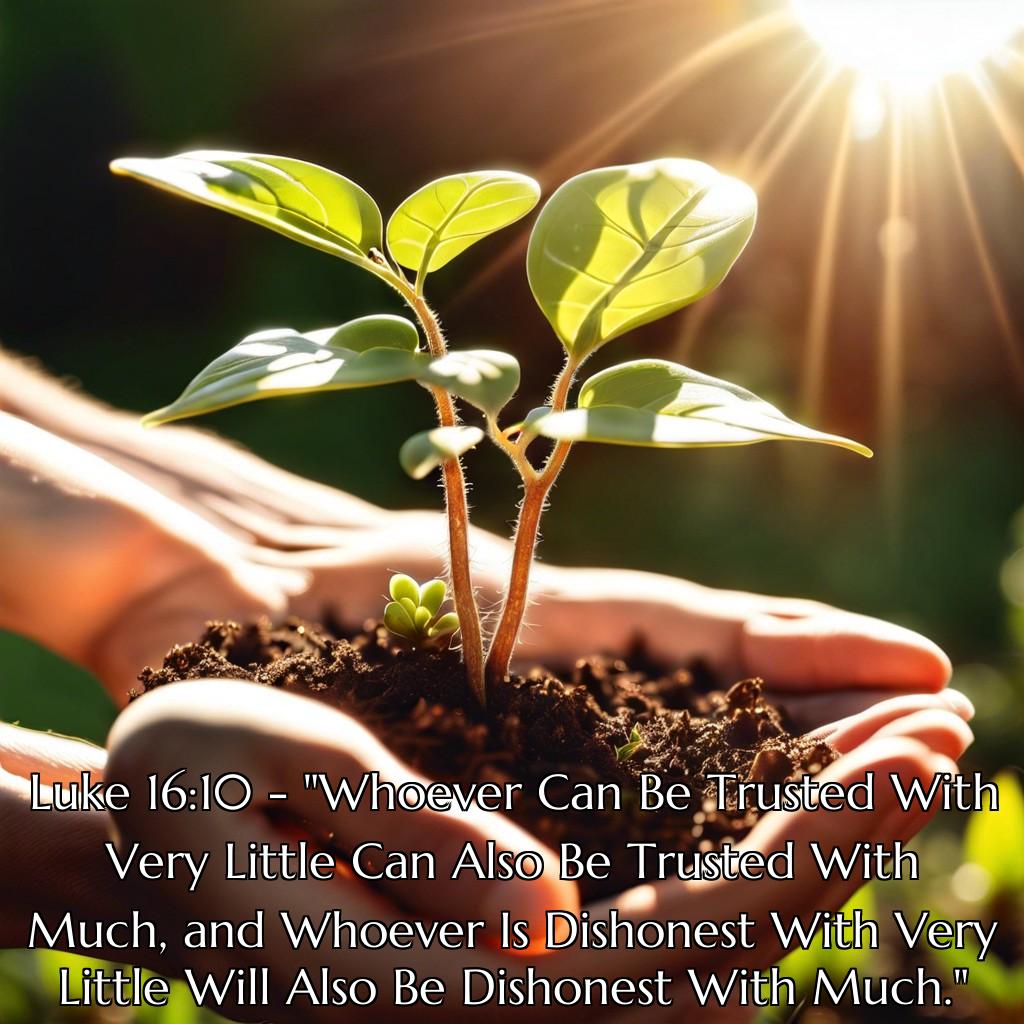This article provides an insightful look at ten bible verses about stewardship, illustrating what it means to take care of the resources God has entrusted to us.
Stewardship is a profound theme woven throughout the Bible, emphasizing the responsibility we carry toward God’s creation, our resources, and our lives. By exploring key verses, we gain a deeper understanding of how to manage and honor what has been entrusted to us. Join us as we delve into scriptures that reveal the true essence of being faithful stewards in God’s eyes.
Genesis 2:15 – “The Lord God Took the Man and Put Him in the Garden of Eden to Work It and Take Care of It.”

In this verse, God entrusts humanity with the responsibility to tend and care for the Earth. It highlights the role of humans as caretakers of God’s creation. This entails more than mere maintenance; it calls for active stewardship.
First, it emphasizes responsibility. Humanity is not just placed in the Garden to enjoy its benefits but to work and protect it.
Second, it suggests partnership with God. We are co-laborers in maintaining his creation.
Third, it fosters an attitude of respect. The Earth is a divine gift, and our stewardship should reflect gratitude and reverence.
In brief, this verse calls every person to be diligent, respectful caretakers of the world around them.
1 Corinthians 4:2 – “Now It Is Required That Those Who Have Been Given a Trust Must Prove Faithful.”

Being given a trust implies a responsibility entrusted by God. Paul emphasizes the need for faithfulness in carrying out this role. Here are some key concepts:
Trustworthiness – Faithful stewardship means being reliable and dependable in managing what God has entrusted to you.
Accountability – Stewards are accountable to God. It is essential to manage resources, talents, time, and opportunities wisely because ultimately, we will answer to Him.
Consistency – Regular, faithful action is crucial. It’s not about grand gestures but continuous, genuine efforts in fulfilling our responsibilities.
Integrity – Carry out your duties with honesty and ethical behavior. True stewardship means doing the right thing even when no one is watching.
Paul’s message is clear: if you are entrusted with something valuable, treat it with the utmost care and diligence.
Matthew 25:21 – “His Master Replied, ‘Well Done, Good and Faithful Servant! You Have Been Faithful With a Few Things; I Will Put You in Charge of Many Things. Come and Share Your Master’s Happiness!’”

The essence of this scripture centers on faithfulness in small responsibilities leading to greater opportunities. The master praises the servant for his trustworthiness, signifying God’s approval of those who manage well what they have been given.
- This verse emphasizes:
- Responsibility: Even small tasks should be handled with care and diligence.
- Reward: Faithfulness in minor duties can lead to greater responsibilities and blessings.
- Joy in Service: Fulfilling our roles well brings us closer to divine approval and shared happiness with God.
It resonates with the idea that every act of stewardship, no matter how insignificant it seems, holds substantial value in the eyes of God. It’s an encouragement to handle all we are given, whether time, talents, or resources, with integrity and dedication.
Luke 16:10 – “Whoever Can Be Trusted With Very Little Can Also Be Trusted With Much, and Whoever Is Dishonest With Very Little Will Also Be Dishonest With Much.”

Trustworthiness in small matters mirrors our integrity in greater responsibilities. It highlights that character is built through consistency in everyday actions.
Small actions matter. Even minor tasks deserve our best effort and honesty. They build a foundation of trust.
Consistency builds trust. Regular, reliable actions make others confident in our dependability.
Dishonesty in little things reveals deeper issues. It shows a lack of integrity that affects larger responsibilities.
Stewardship involves being faithful in all areas, no matter the size. Every task is an opportunity to demonstrate commitment to God’s principles.
1 Peter 4:10 – “Each of You Should Use Whatever Gift You Have Received to Serve Others, As Faithful Stewards of God’s Grace in Its Various Forms.”

This verse calls us to recognize the unique gifts we each possess and to use these gifts in service to others. It challenges us to see ourselves as stewards of God’s varied grace, emphasizing several key concepts:
Use Your Unique Gifts: Whatever talents or skills you have, they are meant to benefit others, not just you. Whether it’s a gift of hospitality, teaching, or encouragement, each is valuable.
Be Faithful Stewards: Taking care of these gifts responsibly means utilizing them to their fullest potential. Don’t let your abilities lie dormant.
Grace in Various Forms: God’s grace manifests differently in each person. Diversity in gifts highlights the multifaceted nature of God’s grace and how it meets various needs.
Serving Others: The primary purpose of these gifts is to serve and uplift others. This selflessness aligns with the teachings of Christ and fosters a stronger community.
Colossians 3:23-24 – “Whatever You Do, Work At It With All Your Heart, As Working for the Lord, Not for Human Masters, Since You Know That You Will Receive an Inheritance From the Lord As a Reward. It Is the Lord Christ You Are Serving.”

This verse encourages us to see all our work as service to Christ, elevating even mundane tasks to a sacred level. Here are some key points to grasp:
Our work holds intrinsic value when done for the Lord, not just for human approval. This mindset transforms our approach, fostering commitment and excellence.
An eternal perspective is crucial. The promise of a heavenly inheritance incentivizes us to perform our earthly duties with diligence and sincerity.
This teaching democratizes faithfulness, making every role, regardless of societal status, significant in God’s eyes. Whether you’re a CEO or a janitor, your work can glorify God and make a difference.
Having Christ as the ultimate Master changes how we view obedience and submission, emphasizing integrity and ethical behavior in all circumstances.
Proverbs 27:23-24 – “Be Sure You Know the Condition of Your Flocks, Give Careful Attention to Your Herds; for Riches Do Not Endure Forever, and a Crown Is Not Secure for All Generations.”

This scripture emphasizes the importance of diligent oversight and management. It offers timeless wisdom on the responsibilities tied to stewardship. Consider the following concepts:
– Know Your Assets: Just as it’s vital for a shepherd to understand the condition of their flock, everyone needs to be fully aware of their resources—be it financial, physical, or otherwise.
– Careful Attention: Stewardship involves routine and thoughtful management. Neglect can lead to deterioration and loss, so it’s crucial to consistently nurture and maintain what you have.
– Transience of Wealth: Material wealth is temporary and can easily vanish. This verse reminds us to be cautious and prudent in how we handle our resources.
Good stewardship requires vigilance and understanding. The wisdom here is universal and timeless, calling us to be diligent caretakers of all we are entrusted with.
1 Timothy 6:17-19 – “Command Those Who Are Rich in This Present World Not to Be Arrogant nor to Put Their Hope in Wealth, Which Is So Uncertain, but to Put Their Hope in God, Who Richly Provides Us With Everything for Our Enjoyment. Command Them to Do Good, to Be Rich in Good Deeds, and to Be Generous and Willing to Share. In This Way They Will Lay Up Treasure for Themselves As a Firm Foundation for the Coming Age, So That They May Take Hold of the Life That Is Truly Life.”

Paul’s advice to Timothy here is invaluable for understanding stewardship. He begins by cautioning against arrogance and the fleeting nature of wealth, emphasizing that real security lies in God. Trusting in material riches is a shaky foundation, whereas divine reliance is steadfast.
Paul then shifts to a proactive approach: urging the wealthy to do good, perform rich deeds, and embrace generosity. This mindset transforms wealth from a potential pitfall into a tool for divine purpose. Generosity not only aids others but also enriches the giver’s spiritual life, creating treasures that outlast earthly possessions.
In essence, Paul advises turning temporary wealth into eternal security through acts of kindness and charity. This is how one lays a firm foundation for the future, living a truly fulfilled and meaningful life.
Proverbs 3:9-10 – “Honor the Lord With Your Wealth, With the Firstfruits of All Your Crops; Then Your Barns Will Be Filled to Overflowing, and Your Vats Will Brim Over With New Wine.”

Honoring God with our wealth means prioritizing Him in our financial decisions. The idea of “firstfruits” suggests giving God the best and first portion of our earnings or resources. This act is both a demonstration of trust and gratitude.
Think of it as an acknowledgment of God’s provision. It’s a way of saying, “Thank you, and I trust you to continue providing.” By putting God first in our finances, we shift our focus from material wealth to spiritual reliance.
In return, the promise is one of abundance. This isn’t just about physical wealth but experiencing God’s blessings in various aspects of life. It’s a reminder that generosity rooted in faith leads to a fulfilling and prosperous life, brimming with more than just material gains.
Matthew 6:19-21 – “Do Not Store Up for Yourselves Treasures On Earth, Where Moths and Vermin Destroy, and Where Thieves Break in and Steal. But Store Up for Yourselves Treasures in Heaven, Where Moths and Vermin Do Not Destroy, and Where Thieves Do Not Break in and Steal. For Where Your Treasure Is, There Your Heart Will Be Also.”

This passage emphasizes prioritizing spiritual wealth over material wealth. Here are some key points to consider:
Earthly treasures are temporary. Material possessions can be destroyed or stolen, exposing their impermanence.
Heavenly treasures are eternal. Spiritual investments, like acts of love and generosity, are secure and lasting.
Heart and treasure alignment. Your values and focus reveal the condition of your heart. Prioritize what truly matters.
Avoid materialism. Living for earthly wealth distracts from spiritual growth. Aim for a balanced perspective.
Jesus invites an eternal perspective. Moving beyond the temporary, investing in what will profoundly impact your soul and others can lead to a life that truly aligns with divine purpose.





